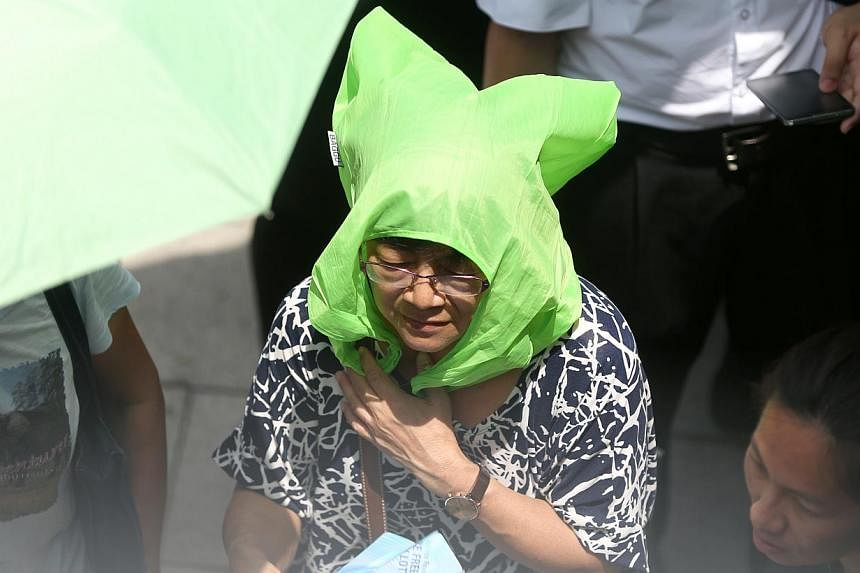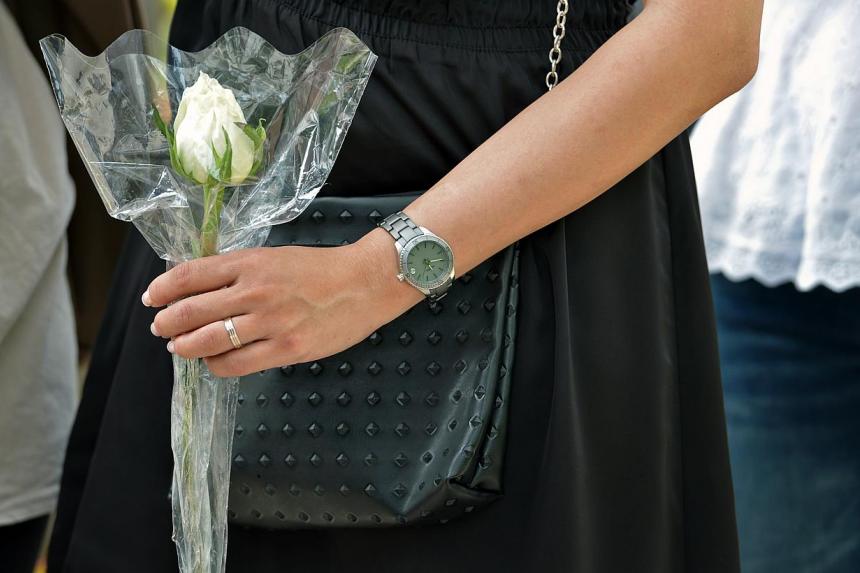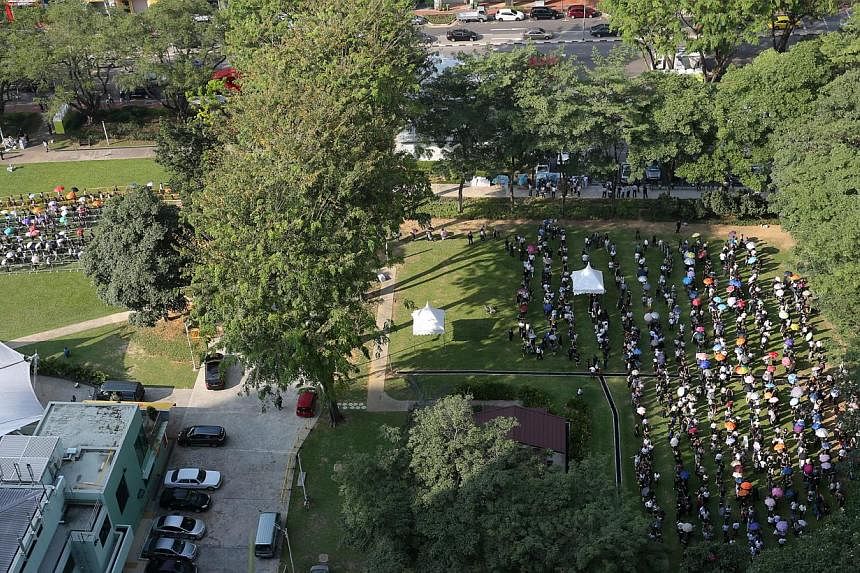WE QUEUED - the old, the infirm, the famous, the nameless.
We lined up - the native, the foreigner, the glorious rich, the huddled poor.
The admirer, the critic, the silver-haired who remember when Singapore was just an idea, the later-born who know nothing but - we came.
On the first day that Mr Lee Kuan Yew's body lay in state at Parliament House, tens of thousands of people queued for up to eight hours under a blazing sky to see him.
At about 10am, I joined the line near Elgin Bridge in North Bridge Road, one among thousands streaming in from all parts of the country.
Some were carrying flowers, others umbrellas - and every single one of us had the same look of dismay and self-doubt on our faces when we discovered how long the line already was.
Fifteen minutes in, the gentleman next to me left.
Two hours in, policemen began putting barricades in place to separate the snaking queue. One of them informed us that it would be six more hours. At this, a middle- aged woman named Janet peeled off. She had to start her work shift at 5pm, she said.
The rest of us tried to stay strong. Mr Geoffrey Low, a 63- year-old retired policeman, valiantly insisted it would pass quickly: "We're almost at UOB Plaza."
We were fortified by cold water and orange punch that a kind- hearted shop owner in Canton Street left out for us.
My fellow queuers and I were a band of brothers. We shared umbrellas and tissue packets, and urged one another to use the toilet and get lunch while we held the places.
I fell in with the Ho family. Mr and Mrs Ho had taken the day off, and Xingda, a 20-year-old Singapore Polytechnic graduate, was there as "I'm quite free nowadays, just waiting for national service, so I came along".
I asked him what he knew of Mr Lee and he said the usual, phrases like "he built the country", repeated so often lately that they sounded almost rote.
Did he know about any of the more controversial things that Mr Lee did? I asked.
"He locked up some people for, like, 20 years, right? I know he was quite hard on the opposition."
Satisfied that our young people are alive to the complexities of his legacy, I told Xingda about some of Mr Lee's lieutenants, like Dr Goh Keng Swee and Mr S. Rajaratnam, who also built the nation.
Mr Lee always credited the importance of a good team, I said. He would not have wanted anyone to think he did it alone.
They are all gone now. With Mr Lee, the last leaf has fallen. In a way, we are orphans now.
I sensed Xingda losing interest when he said, pointing at a lavender-haired pint-sized woman up ahead: "Eh look, there's Xiaxue!" The local celebrity blogger was in line with about 50 friends.
The wait became easier when we reached UOB Plaza. The cool river breeze and wide open vista were a welcome change from being stared at by the office lunch crowds over their mee goreng.
But I began to lose heart around 2pm, about four hours in. "Why are we doing this? I'm so tired and I think I'm getting a sunburn," I complained to Geoffrey.
He gave me a pep talk that, to my surprise, had little to do with how much Mr Lee sacrificed for Singapore. "You'll never get a chance like this again," he told me. "This is history. It's like when Mao Zedong died.
"There won't be another like him. So we should be here."
It reminded me of that Shakespearean quote, when Cassius calls Julius Caesar a Colossus who "bestrides the narrow world".
"We petty men/Walk under his huge legs and peep about," goes the line.
Transformative leaders like Mr Lee come around once in a lifetime, maybe less. A life like his is out of the reach of us ordinary folk. But we can be a passing part of the great acts of an extraordinary journey. To be here, to bear witness at the final moment - this is important, somehow. Perhaps more important than anything else we will do in our lives.
I went to use the toilet at one of the office buildings while Geoffrey held my place in the line.
As the sliding doors whooshed open and air-conditioned air caressed my face like the hands of an angel, I remembered that Mr Lee once called air-conditioning the greatest invention in history.
It changed life in the tropics, he said, and he once inquired after the possibility of air-conditioned underwear.
Back at the queue, we passed by a bust of Deng Xiaoping outside the Asian Civilisations Museum. Deng admired Mr Lee and saw Singapore's success as one reason to embark on his epochal reform and opening up of China.
Mr Lee had called him the exception to the rule that great leaders are of tall stature. He always told it like it was, I thought to myself. Mr Lee drummed it into Singaporeans that we were small and vulnerable and yet he was never cowed or bullied by any larger nation. Stature is about more than literal size.
Once we crossed Cavenagh Bridge, the line moved briskly. Soon we were at the tentage.
Geoffrey let on that this was far from the longest he had ever queued for anything. He once lined up overnight for Bee Gees concert tickets.
After we passed through security screening, all the flowers that people had brought as final gifts for Mr Lee were rather unceremoniously taken by a young full- time national serviceman. We walked into the air-conditioned Parliament House and everyone tensed up. I don't know what I expected, but the moment happened almost as if by accident.
Later, I learnt that because of the unexpectedly massive crowd, the authorities changed the system to get people to pass through more quickly. We were supposed to have stood in a group and bowed. But instead, we started walking through the hall and before we knew it, we were passing by a flag-draped coffin, and then were past it and out the hall.
All the while, the guards told us to "please keep moving".
We exited the building and everyone looked a bit disoriented at how fast that happened, after the hours of build-up.
As we rounded the back, people were stopping in front of a tinted window. It was almost completely opaque, but if you looked closely, you could make out the lines of Mr Lee's coffin and the stars on the flag that covered it.
Without the opportunity to linger in front of his coffin, people resorted to bowing, weeping and saying their prayers for Mr Lee to that tinted window.
There was a loosening in my chest. It felt like I had done something important and necessary, even if all I did was stand in line for five hours. I said to Geoffrey: "Well, we were there." I was aiming for a note of sarcasm at the anti-climax of it all, but my voice came out a little strained.
He nodded in full understanding, replying: "That's all that matters."
ACTS OF KINDNESS
THE Song Fa Bak Kut Teh eatery along North Bridge Road set up standing fans and chairs for people needing a rest. It also spent more than $300 on water, ice, plastic cups and a water dispenser for people waiting in line.
The restaurant was one of several businesses that tried to offer some respite for Singaporeans queueing in the hot sun for hours yesterday.
Others included Fullerton Hotel, the Asian Civilisations Museum and the Clarke Quay management, which distributed water and other drinks to thirsty members of the public.
Over at Raffles Place MRT Station, florist Artisan de Fleurs gave free white flowers to those going to pay their respects at Parliament House.

GRATEFUL FOR CLEAN TOILETS
"I had to ask someone to leave my flowers and a note thanking him. Last time, very dirty - (but thanks to Mr Lee), change and change so we now have clean toilets. Hope his children will be able to do the same."
- Madam Wong Ah Mee, 74, a cleaner. She queued during her lunch break between 11.30am and 12.30pm, but could not get in

KEEN LEARNER
"I was in the St John Ambulance Brigade, and Mr Lee visited the school during one of our events. Knowing we were a Chinese-educated school, he told us to speak to him using Mandarin to improve his skills. He was never afraid to learn more where he felt he needed to, even from students."
- Madam Yvonne Yu, 71, who joined the queue at 3pm. The former civil servant met Mr Lee during her secondary school days at Nan Chiau Girls' High School. Many years later, she ran into Mr Lee while she was exercising in the Marina Bay area. He was dressed in sports gear and accompanied by security officers. Even then, he went over to say hello and ask how she was doing
A GOOD MOVE
"I came to Singapore in 1977 because I had married a Singaporean. Back then, I landed at Paya Lebar Airport and found Manila more advanced than Singapore. But Singapore has overtaken the Philippines by leaps and bounds. When I first arrived, $1 was 3 pesos. Now, $1 gets more than 30 pesos. I'm glad I came to Singapore. My three children got a good education here and are doing well."
- Mrs Lanie Low, 57, a housewife, who was born in the Philippines and became a Singaporean in 1988. She joined the queue at 8.30am with her daughter and grandson, and waited for four hours

HIS POLICIES BENEFITED US
"I felt I had to pay my respects to Mr Lee anyway. By stabilising Singapore, he stabilised the rest of Asia as well. It was because of his sound policies that I decided to send my daughter to Singapore instead of Britain or the United States, which she could have easily qualified for. I have never once regretted my decision."
- Mr Sun Zhen Yang, 63, from Shanghai, queued for nearly five hours despite a foot injury and his doctor's advice not to stand for long periods
SUSTAINING THE CROWD
"Standing for two to three hours without food and water is very harsh, you will get hungry very easily. For the people queueing to pay tribute to Mr Lee, this is the least we could do."
- Mr Alex Goh, 51, director of Aldrich Office Furniture and Projects. He set up a stand In Circular Road with staff, his wife and children, offering drinks and biscuits to those in the queue









